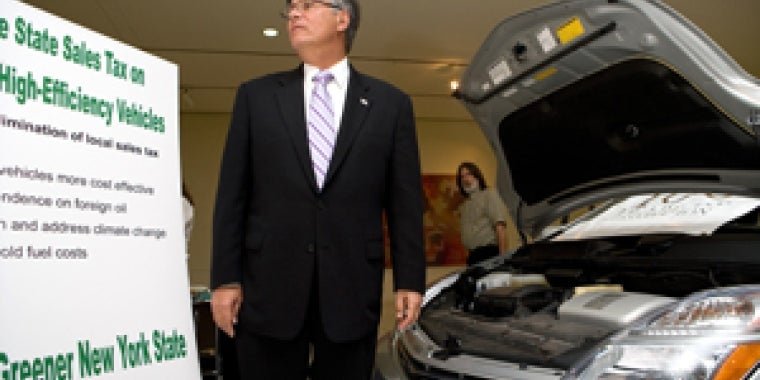
Senate Passes Tax Exemption For Hybrid And High Mile-per-gallon Vehicles

New York State Senate Deputy Majority Leader Dean G. Skelos (R-Rockville Centre) and the state’s leading environmental advocacy organizations applauded the Senate’s passage of legislation providing tax incentives for the purchase of hybrid and high mile-per-gallon vehicles and called for immediate action in the State Assembly.
"This legislation is an important first step toward reducing our dependence on foreign oil and protecting our environment," said Senator Skelos. "By making hybrid vehicles more cost-effective and promoting the use of other gas conscious cars, we will begin dramatically reducing our gasoline consumption, easing the burden that higher fuel costs impose on household budgets, reducing air pollution and addressing global climate change. With less than three weeks remaining in the legislative session, the Assembly has a responsibility to pass this important initiative now."
This legislation would eliminate the assessment of the state sales tax on the purchase of new and used hybrid vehicles. In addition, the sale of new and used vehicles from Model Year 2008 and beyond that achieve a highway fuel economy estimate of 35 miles per gallon or more, as certified by the United States Environmental Protection Agency, would be exempt from state sales tax. The legislation also enables New York City and county governments to eliminate their local sales tax on hybrid and high mile-per-gallon vehicles.
"Senator Skelos, and the New York State Senate are to be commended for taking this important step to provide New York residents with an incentive to reduce their personal carbon footprints, and reduce their use of fossil fuels by promoting the use of efficient vehicles," said Albert E. Caccese, Executive Director of Audubon New York. "Overwhelming public support has been growing for this legislation, and we urge the Assembly to move quickly so that residents will not delay their purchase of hybrid or high efficiency vehicles."
"We applaud the Senate for passing legislation to provide sales tax credits for hybrid and high mileage vehicles. This legislation will result in real environmental and economical benefits by reducing global warming pollution and helping to ease pocketbook pain at the pump," said Adrienne Esposito, Executive Director of Citizens Campaign for the Environment. "We are hopeful that the Assembly and Governor will finish building this bridge to help working class New Yorkers transition to more fuel efficient cars," Esposito concluded.
"We would like to thank Senator Skelos and the entire Senate for passing this important legislation," said Alison Hirsh, Director of Policy and Advocacy for the New York League of Conservation Voters. "By establishing a financial incentive for consumers to purchase hybrid vehicles, this legislation makes smart environmental decisions into smart economic decisions as well. New Yorkers around the state will be able to afford to buy hybrid vehicles and begin to do their part to reduce greenhouse gas emissions and curb the effects of climate change. We look forward to working with Senator Skelos and with Assemblyman Englebright in the final weeks of the legislative session to ensure that this bill passes the Assembly and is signed into law."
"This bill empowers consumers to make the best choice at the car dealership," said Richard Schrader, New York Legislative Director for the Natural Resources Defense Council. "Providing an incentive for hybrid and other high-efficiency vehicles allows New Yorkers - of all economic backgrounds - to afford cars that will reduce global warming emissions and save them money at the gas pump. If this measure passes, New York State will once again demonstrate its leadership in addressing global warming with real everyday solutions."
As an example of the environmental benefits of hybrid vehicles, the Toyota Camry hybrid uses approximately 29% less gasoline than the non-hybrid version. At 14,000 miles driven per year, the hybrid owner would save roughly $425 in additional fuel costs. As noted by Consumer Reports, however, even the "most cost-effective models require an investment of about five years for the owner to break even." This legislation will reduce this cost recovery period.
The state tax credit for the purchase of hybrid vehicles expired in 2005. The federal government provided a personal income tax deduction of up to $2,000 for hybrid vehicles purchased in 2004 and 2005. In 2006, the federal tax deduction converted to a tax credit the amount of which depends on the make and model of the vehicle and the date on which it was purchased. Because, this credit phases out as more vehicles are purchased, the new state sales tax exemption is even more necessary to reduce the cost recovery period.
This legislation passed by a unanimous vote.
#####

